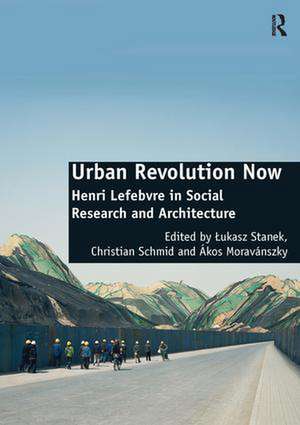Urban Revolution Now: Henri Lefebvre in Social Research and Architecture
Autor Christian Schmid Editat de Lukasz Staneken Limba Engleză Hardback – 17 dec 2014
Preț: 772.68 lei
Preț vechi: 1107.75 lei
-30% Nou
Puncte Express: 1159
Preț estimativ în valută:
147.85€ • 154.78$ • 122.34£
147.85€ • 154.78$ • 122.34£
Carte tipărită la comandă
Livrare economică 05-19 aprilie
Preluare comenzi: 021 569.72.76
Specificații
ISBN-13: 9781409442936
ISBN-10: 1409442934
Pagini: 368
Ilustrații: Includes 49 b&w illustrations
Dimensiuni: 174 x 246 x 29 mm
Greutate: 0.93 kg
Ediția:New ed
Editura: Taylor & Francis
Colecția Routledge
Locul publicării:Oxford, United Kingdom
ISBN-10: 1409442934
Pagini: 368
Ilustrații: Includes 49 b&w illustrations
Dimensiuni: 174 x 246 x 29 mm
Greutate: 0.93 kg
Ediția:New ed
Editura: Taylor & Francis
Colecția Routledge
Locul publicării:Oxford, United Kingdom
Cuprins
Contents: Introduction: theory, not method - thinking with Lefebvre, Christian Schmid, Åukasz Stanek and Ãkos Moravánszky. Part I On Complete Urbanization: The trouble with Henri: urban research and the theory of the production of space, Christian Schmid; During the urban revolution - conjunctures on the streets of Dhaka, Elisa T. Bertuzzo; Where Lefebvre meets the East: urbanization in Hong Kong, Wing-Shing Tang; Henri Lefebvre and ’colonization’: from reinterpretation to research, Stefan Kipfer and Kanishka Goonewardena. Part II Contradictions of Abstract Space: Plan Puebla Panama: the violence of abstract space, Japhy Wilson; ’Greater Paris’: urbanization but no urbanity - how Lefebvre predicted our metropolitan future, Jean-Pierre Garnier; The production of urban competitiveness: modelling 22@Barcelona, Greig Charnock and Ramon Ribera-Fumaz; Reconstructing New Orleans and the right to the city, M. Christine Boyer. Part III Everyday Architectures: Ground exploration: producing everyday life at the South Bank, 1948-1951, Nick Beech; The space of the square: a Lefebvrean archaeology of Budapest, Ãkos Moravánszky; The archi-texture of power: an inquiry into the spatial textures of post-socialist Sarajevo, Mejrema Zatri; For difference ’in and through’ São Paulo: the regressive-progressive method, Fraya Frehse. Part IV Urban Society and its Projects: Architectural project and the agency of representation: the case of Nowa Huta, Poland, Åukasz Stanek; The debate about Berlin Tempelhof Airport, or: a Lefebvrean critique of recent debates about affect in geography, Ulrich Best; Novi Beograd: reinventing Utopia, Ljiljana Blagojevi; Lefebvrean vaguenesses: going beyond diversion in the production of new spaces, Jan Lilliendahl Larsen. Index.
Notă biografică
Åukasz Stanek is a Lecturer in Architecture at the University of Manchester, UK; Christian Schmid is Professor of Sociology at the School of Architecture, ETH Zürich, Switzerland and Ãkos Moravánszky is Professor of Architecture, ETH Zürich, Switzerland.
Recenzii
’Lefebvre’s thought has perhaps never been more important than today as urban insurgencies around the world are reshaping the politics of planetary urbanization and announce a new urban revolution. This book is truly a milestone in actualizing Lefebvre for our contemporary urban condition.’ Erik Swyngedouw, University of Manchester, UK ’Henri Lefebvre's approach to the production of urban space continues to inspire radical theory and research in relation to diverse conditions, transformations and struggles in cities around the world. This book offers powerful evidence that the theories and concepts developed by Lefebvre may be productively mobilized to illuminate major dimensions of contemporary urbanization processes. As this volume assertively demonstrates, Lefebvre's work remains an essential resource for contemporary forms of critical urban theory - and praxis.’ Neil Brenner, Harvard University, USA
Descriere
This volume is the first to develop Lefebvre’s concepts in social research and architecture by focusing on urban conjunctures in Barcelona, Belgrade, Berlin, Budapest, Copenhagen, Dhaka, Hong Kong, London, New Orleans, Nowa Huta, Paris, Toronto, São Paulo, Sarajevo, as well as in Mexico and Switzerland. With contributions by historians and theorists of architecture and urbanism, geographers, sociologists, political and cultural scientists, Urban Revolution Now reveals the multiplicity of processes of urbanization and the variety of their patterns and actors around the globe.
